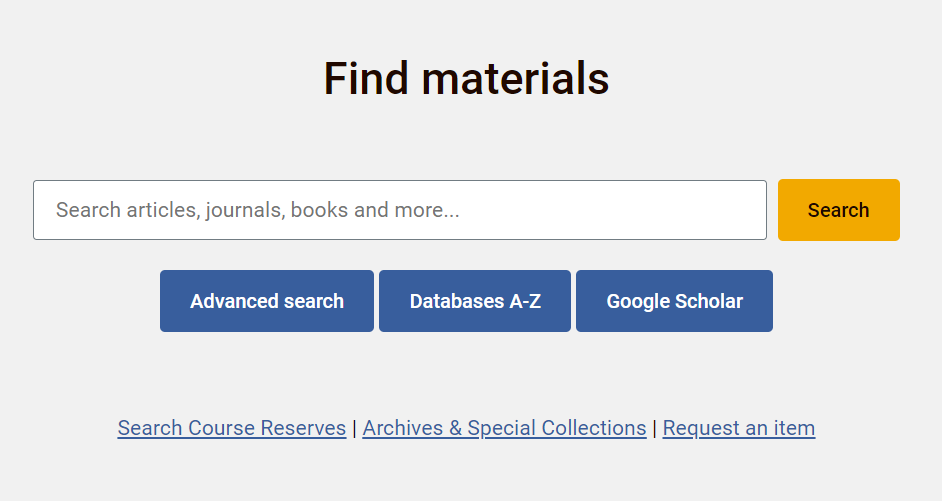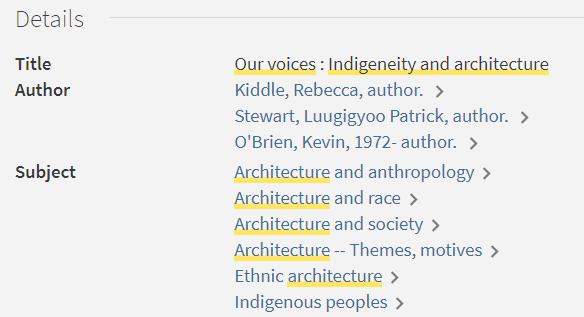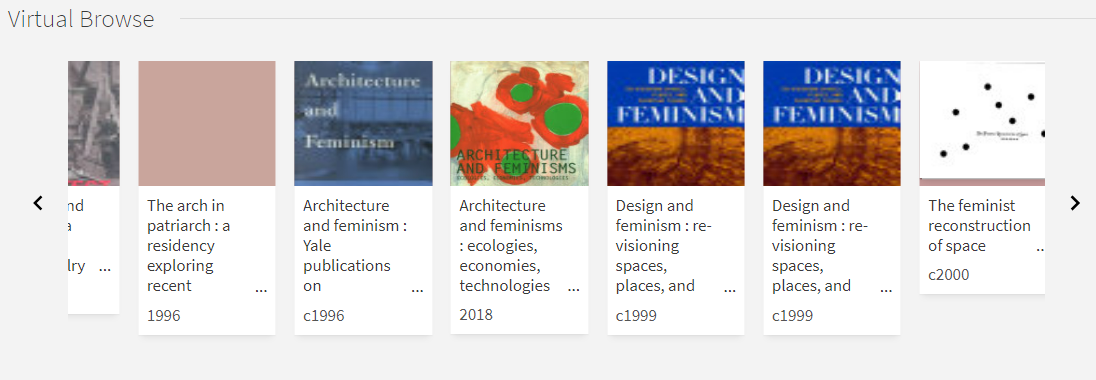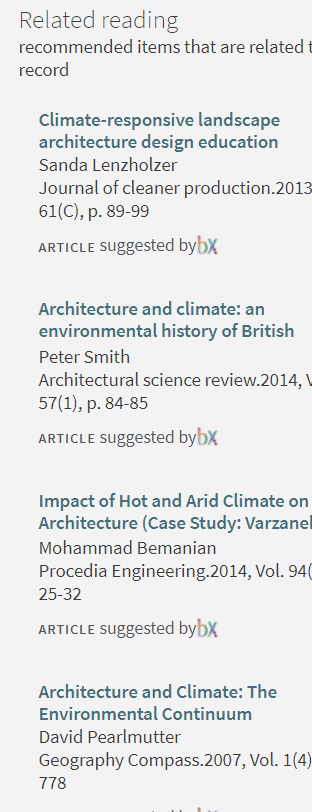EVLU 3010
Landscape and Urbanism Theory:
Research Strategies and Resources

Welcome, About Me
- I have a BFA in Art & Design, after working in community arts/education for a decade I did an MLIS and joined the UML team to support the architecture faculty.
- My favourite part of my job is helping students with their research and learning about their projects!
- When I'm not at UML you'll probably find me hiking/cycling, making art, or supporting library & information services to prisoners

Today we will look at:
My goal today is to introduce you to potentially new library and internet search tips and strategies for you to feel more confident in library research and what resources are available to you.
-
Places to find resources in the library collection (books, ebooks, peer-reviewed articles, and images)
-
Tips for starting research and searching strategically
-
Evaluating resources
-
Library Services during the pandemic
-
Resources for Citation
Internet vs Library
- Not all information is available on the internet, most scholarly info is not or requires payment
- Highly disorganized, does not bring up the most relevant or all results (ads, sponsored pages, algorithms)
- No quality control - anyone can produce content
- Can still find credible information
- Some high quality open access content (databases, image/video, and journals)
- Great for portfolios/websites of designers and blogs or organizations dedicated to landscape architecture.
- Information is cataloged and can be more accurately searched/retrieved
- Access to information that exists behind paywalls (journals, articles, databases)
- Access to primary resources
- Scholarly and peer-reviewed content
- Interlibrary loan - document delivery
- Support from librarians with subject expertise
UM Library Search
- Very broad search engine - you may receive results from all subject areas (more results if you're signed in)
- Where you can search all physical resources (books)
- Content from some, not all, of the library's databases including resources like:
- ebooks
- peer-reviewed journal articles
- images (more results if you're signed into your account)
- Can apply filters to narrow results

For more sources in library search check:
- the bibliography/citations of a work you're looking at

Virtual Browse


Related Reading
Subject Headings
Subject Guides
- For curated subject-specific research suggestions: databases, journals, citation resources, websites, and more
Reference Resources
(encyclopedias, dictionaries, textbooks, etc.)
- Overview of a person, movement, sometimes a specific building
- UM Library Search > limit Resource Type to Reference Entries
- Credo Reference (reference resources, dictionary entries, some images)
- Oxford Art Online (dictionary entries and peer reviewed articles from ancient to contemporary)
- Artstor (images of arts and architecture)
Journal Articles
- UM Library Search > limit Resource Type to articles
- Avery Index to Architectural Periodicals (journal articles on architecture 1934-present)
- JSTOR (database hosting broad coverage of journals with peer-reviewed articles, including the arts)
Searching Images
-
Library Search - apply filter to limit resource type to images
- If you're signed in this pulls images from databases including Artstor
- All these results are copyrighted to use for educational purposes
-
Databases
- Go directly to image databases such as Artstor, Oxford Art Online, and other databases listed in the environmental design guide.
-
Open Access content
- the Images page of the environmental design guide has suggested open access resources.
- Flicker commons
-
Images Via Google Images
- Might be uploaded illegally or have copyright restrictions, check the terms of use and be cautious (ask for library help if you're unsure), only use images listed as fair use. Try searching using the google image advanced options.
Questions?
Research: Where to Start?
-
Research is non-linear and iterative, get curious and inspired by exploring your topic broadly!
-
Begin by forming a research question (this may evolve/refine)
-
Brainstorm keywords based on what you know & what Qs you have
-
What do you know about the subject so far?
- terms, names, concepts, theories,
-
What do you know about the subject so far?
-
Expand your background information
- Check reference sources for background info (dictionaries, encyclopedias, textbooks etc), add to keywords
-
Check the library search and use filters to explore results
-
Check the most relevant subject guide for databases to search
-
Expand search via sources from bibliographies and new keywords
Search Tips
Phrase your topic as a research question
- Break down your topic into keywords and brainstorm synonyms
- Try to articulate different ways of expressing a concept that you are searching
Keywords
- searching with more keywords = more specific and fewer results
- searching with fewer keywords = more broad and more results
Search Tips: More Results
Broadening Your Results
-
You can give the search more options by placing similar words in brackets, separated by OR: (design OR architecture) (Great Spirit OR Gitche Manitou) (Shang Dynasty OR Zhou Dynasty)
- These will cause results to all have at least one of those words in the title, description, and/or the text
- Wildcard: Add an asterisk (*) to the end of a word to get results that include the root word as well as any possible endings:
Architect* finds: Architect, Architects, Architecture, Architectural...
Christian* finds: Christian, Christians, Christianity...
Note: be careful where you place the *, for example Christ* would also find: Christmas, Christo (an artist)
Search Tips: More Specific
Narrowing Your Results
- Place a phrase "in quotation marks" to search that exact phrase or order of words
- ex. "social justice", "Douglas Cardinal"
- Use NOT to exclude unrelated content
- union NOT soviet - for content about unions but not the Soviet Union
Learn at the Libraries: Advanced Search
Brainstorm some keywords you could use to start a search for this research question
Brainstorm some advanced search possibilities using:
"blank", (blank OR blank), AND, NOT, *
(decolonial OR decolonization) AND ("landscape architect*" OR "landscape design*")
"landscape architecture" AND (decolonize OR Indigenize)
"Indigenous worldview" AND "landscape architect*"
Indigenous AND (perspective OR worldview) AND "landscape architect*"
"landscape architect*" AND canad* AND Indigenous
"landscape plan*" AND Indigenous
Evaluating Sources
Evaluating External Sources
Learn at the Libraries: Evaluating
CRAAP Test
Currency - Is there a date the page was published or updated? How current are the cited sources? Are there broken links?
Relevancy - who is the intended audience?
Authority - is the author a recognized expert in this field?
Accuracy - supported with evidence (citations)? Peer-reviewed?
Purpose - to inform? teach? entertain? persuade? sell? Check the domain (eg: .com = commercial, .org = non-profit, .edu = educational...
Identifying Bias
Evaluating a Source for Bias
- Does the information appear to unfairly favour a group or perspective over others?
-
Is the information misrepresented?
-
Is there other important information missing?
-
Whose perspectives and experiences are included? Whose are excluded?
-
Who will benefit from the information as it is presented?
-
Will the information cause harm or disadvantage another?
In what ways have you examined your own worldview, assumptions, and biases through collaborative and reflective practices?
Chicago Citation Style
- Learn at the Libraries: Citing
- Environmental Design Subject Guide: Citing and Writing
- Full style manual available online!
- Purdue Online Writing Lab (OWL) has a great list of examples of how to cite using Chicago style
Images
- Tips and examples for citing images are available in the Environmental Design Guide Images and Citing & Writing pages
Pandemic Library Services
- Online/digital services always available
- Print Books
- request to pick-up books from locker
- request a scan of a book
- Ebooks and Digitized books
- HathiTrust: temporary electronic versions of some print books.


Questions?
Citing and Writing
Citing:
- Quick help: Ask Us library chat
- Reach out to Ashley (may take 1-2 days)
Writing:
- Guidance on writing style or going over citation style in your assignment/paper
-
Faculty of Architecture Writing Tutor:
- Tutor: Amanda Ross: Amanda.Ross@umanitoba.ca
Questions?
- Subject Guides
-
Environmental Design Subject Guide
- For subject specific research suggestions: databases, journals, citation resources, and more
- Library Ask Us chat
-
Environmental Design Subject Guide
-
Learn at the Libraries
- For tips and resources on searching the library, evaluating resources, and citations
- Contact Ashley for help with search strategies for your topic or assignment, advice on which databases to use, and citation questions
- email ashley.huot@umanitoba.ca
- Book an appointment for a phone or video chat